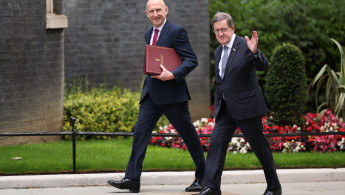UK launches armed forces review after NATO summit and growing threat from 'deadly quartet'
Britain on Tuesday launched a review of its armed forces, with the former NATO chief leading the evaluation warning the world faces a "deadly quartet" of China, Russia, Iran and North Korea.
The assessment, ordered by Labour Prime Minister Keir Starmer less than a week after he returned from a NATO summit, will set out a path to increasing defence spending to 2.5 percent of GDP.
The Ministry of Defence said the Strategic Defence Review would begin work "immediately in recognition of the urgency of the threats facing the UK", and aim to deliver a report in the first half of 2025.
UK spending on defence in 2023 stood at 2.26 percent, according to latest official figures, while Poland spent 3.83 percent, the United States 3.36 percent and France 2.06 percent.
The review will be headed by George Robertson, a former UK defence secretary under Tony Blair and NATO secretary general from 1999-2003, and include foreign policy expert and former US presidential adviser Fiona Hill.
"We're confronted by a deadly quartet of nations increasingly working together," Robertson told a briefing on Monday referring to China, Russia, Iran and North Korea.
The UK and its allies had "to be able to confront that particular quartet", he said, adding that the world had changed "out of all recognition" since he was last in government.
His comments are a shift in tone from former prime minister Rishi Sunak's Conservative government which described Beijing as a "systemic challenge" and echoes NATO's hardening of its stance on China.
The review, launched less than two weeks after coming to power, is the government's response to Conservatives' efforts to cast doubts about Labour's commitment to defence.
During the election campaign, popular attack lines from the Tories included Starmer's lack of timeframe for increasing defence spending and claims that Labour was a "danger" to national security.
Labour has accused the Conservatives of "hollowing out" Britain's armed forces during its 14 years in power, with cuts notably in personnel, units and equipment.
Starmer said during the election campaign that the army, with some 75,000 regular soldiers, is at its smallest size since the Napoleonic wars in the early 19th century, prompting questions about its ability to fight an all-out war.
At last week's NATO summit in Washington, Starmer reaffirmed the UK's support for the Western military alliance and its "serious commitment" to spending 2.5 percent of its GDP on defence.
Starmer said the review would make sure "that defence spending is responsibly increased".
It will be overseen by current defence secretary John Healey, who said "at the start of a new era for Britain, we need a new era for defence".
"The review will ensure that defence is central to the future security of Britain and to its economic growth and prosperity", Healey added.
The defence secretary had urged NATO to consider moving towards a 2.5 percent goal at the 75th anniversary summit last week, with NATO allies having committed in 2014 to reach a two-percent goal.
European countries still to reach the two-percent target included the Netherlands, Germany and Spain who all spent just around 1.5 percent.
Other specific aims of the review include "bolstering Ukraine in its fight against Russian aggression" and to "modernise and maintain the nuclear deterrent".





 Follow the Middle East's top stories in English at The New Arab on Google News
Follow the Middle East's top stories in English at The New Arab on Google News


